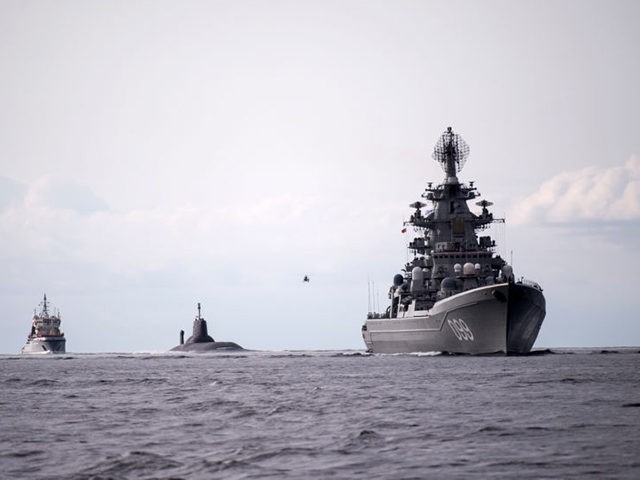Russian news sources reported Monday that Russia, China, and Iran will hold joint naval drills in the northern Indian Ocean in the next few weeks. The precise date and scope of the exercises were not specified.
The Jerusalem Post speculated Monday that the multilateral exercise might occur near the Gulf of Oman, which connects to the strategically vital Strait of Hormuz, one of the world’s busiest oil shipping lanes.
Iran frequently threatens to block the Strait of Hormuz or attack foreign shipping if its demands are not met. The United States has flown heavy bombers over the Persian Gulf half a dozen times since November to deter Iranian aggression against ships in the Strait of Hormuz and surrounding waters. Then-President Donald Trump also blamed Iran for rocket attacks against the U.S. embassy in Baghdad and pledged to “hold Iran responsible” if any Americans were killed in subsequent attacks.
The U.S. extended the deployment of the aircraft carrier USS Nimitz to the region in December as a signal to Iran, as well as making the carrier available to support troop movements out of Somalia. The Nimitz is currently conducting exercises in the South China Sea with another carrier, the USS Theodore Roosevelt, and is scheduled to return to the United States after the drills are completed.
The Russian ambassador to Iran, Levan Dzhagaryan, suggested the joint exercise with China and Russia would primarily concern “search and rescue operations and ensuring the safety of shipping.” The Iranians have more belligerently presented previous multilateral naval exercises as demonstrations of force to “show that Iran cannot be isolated,” as Iranian Adm. Gholamreza Tahani said in 2019.
The Russian Defense Ministry announced it has dispatched three ships from its Baltic fleet to participate in the exercise, including a frigate, a tanker, and a rescue tug.
The previous Russian-Chinese-Iranian naval drill in the Gulf of Oman was held in December 2019 and lasted four days. Adm. Tahani hailed the exercise as a sign of the alliance between Tehran, Moscow, and Beijing reaching a “meaningful” level, and an acknowledgment of Iran’s growing naval power. Regional tensions were running high at the time because the United States had accused Iran of attacking two oil tankers in the Strait of Hormuz six months earlier.
Newsweek suspected the rather sudden Indian Ocean exercise is meant as a shot across the bow of the Biden administration:
The rare convergence of U.S. rivals comes as Biden proclaims that “America is back,” indicating an apparent return to traditional foreign policy trends recalibrated under former President Donald Trump’s “America First” policy.
However, just how far Biden will take this recalibration is not yet clear.
Although his administration has vowed to be tougher on Russia, it has left Trump’s hardline policies toward China and Iran in place. The U.S. levied devastating sanctions against Iran when Trump decided unilaterally to leave the 2015 nuclear deal to which Beijing and Moscow were also parties, along with France, Germany and the United Kingdom.
Like many other media outlets reporting on the Russian announcement, Newsweek and the Jerusalem Post implied the departure of the Nimitz cleared the stage for a combined Russian-Chinese-Iranian demonstration of naval power.

COMMENTS
Please let us know if you're having issues with commenting.